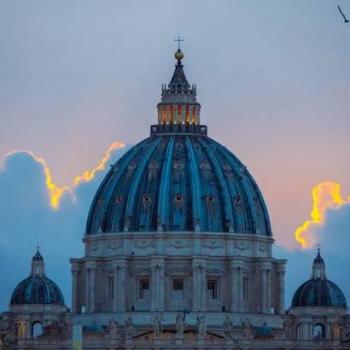Vatican City, Jul 17, 2015 / 03:12 pm (CNA/EWTN News).- On Thursday, Pope Francis authorized a decree recognizing the heroic virtue of Archbishop Andrey Sheptytsky, who was head of the Ukrainian Greek Catholic Church from 1900 to 1944, and who personally protected dozens of Jews from Nazi occupiers during World War II. The Pope's July 16 audience with the prefect of the Congregation for the Causes of Saints also recognized the heroic virtue of seven other potential saints, who will now be called 'Venerable'. “During this time of foreign aggression against Ukraine – as well as turmoil in so many other historically Eastern Christian lands – this recognition brings particular consolation,” Fr. Peter Galadza, acting director of the Metropolitan Andrey Sheptytsky Institute of Eastern Christian Studies, stated July 17. “Archbishop Sheptytsky demonstrated saintly courage when he sheltered more than 160 Jews during the Nazi Holocaust.” Venerable Andrey Sheptytsky was born as Roman Aleksander Maria Sheptytsky in 1865 to a polonized family of Ukrainian heritage, who were Roman Catholics. He was born in a village 30 miles from Lviv, which was then part of the Austrian Empire. He entered the Order of St. Basil, associated with the Ukrainian Greek Catholic Church, taking the name Andrey (Andrew), and was professed in 1889. In 1892, he made solemn profession and was ordained a priest. In 1899 he was consecrated a bishop, and appointed Bishop of the Ukrainian Eparchy of Stanislaviv (now Ivano-Frankivsk). Then in 1901 he was appointed Metropolitan Archbishop of the Ukrainian Eparchy of Lviv, making him head of the Ukrainian Greek Catholic Church. He maintained his position until his death on Nov. 1, 1944, at the age of 79. His time as Metropolitan Archbishop was marked by conflict with and persecution by the successive governments that ruled Ukraine, including the Russian Empire, the Second Polish Republic, Nazi Germany, and the Soviet Union. Under the Russian Empire, he was jailed from 1914 to 1917 for his pro-Ukrainian position and his promotion of Catholicism. The Second Polish Republic twice held him for supporting an independent Ukrainian state and for opposing Latinization. When the Soviet Union occupied Poland in 1939, he opposed the atheist regime and supported an independent Ukraine, and at first welcomed Nazi armies as liberators when they pushed back the Soviets in 1941. However, he spoke up against Nazi policy toward Jews, encouraging his faithful to treat Jews well, with a 1942 pastoral letter. He also encouraged his priests and local abbots to follow his example, and shelter Jews. In this he was helped by his brother, Blessed Klymentiy Sheptytsky, archimandrite of the Ukrainian Greek Catholic Church's Studite monks. Archbishop Sheptytsky also promoted Christian unity: Fr. Galadza noted that the archbishop “worked tirelessly throughout his lifetime for reconciliation between Ukrainians, Russians and Poles, as well as other nations and groups. Particularly legendary were his efforts to see Catholics and Orthodox overcome their historical estrangement. Sheptytsky was a precursor of the ecumenical movement long before the Catholic Church officially endorsed the movement.” Fr. Galadza also reflected on Venerable Sheptytsky's concern for the poor, saying he “used his resources to create a free clinic, provide countless scholarships and help victims of famine, flooding and war.” The other persons whose heroic virtue were recognized July 16 are: Bishop Giuseppe Carraro, who led the Diocese of Verona from 1958-1978; Fr. Agostino Ramírez Barba, a diocesan priest who founded the Sister Servants of the Lord of Mercy; Fr. Simpliciano della Natività, OFM, founder of the Franciscan Sisters of the Sacred Heart; Maria del Rifugio Aguilar y Torres, foundress of the Mercedarian Sisters of the Most Holy Sacrament; Maria Teresa Dupouy Bordes, foundress of the Missionaries of the Sacred Hearts of Jesus and Mary; Elisa Miceli, foundress of the Rural Catechist Sisters of the Sacred Heart; and Isabella Méndez Herrero, a sister of the Congregation of the Servants of St. Joseph. Read more




















